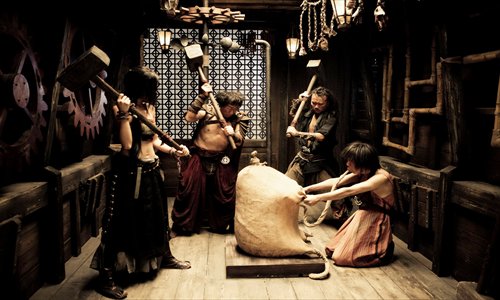Journeyed out

It took Stephen Chow almost 20 years to reach the end of the journey.
As one of China's pioneering comedians and directors, Chow has had a particular fascination with Xiyou, or Journey to the West. He starred in two parts of A Chinese Odyssey in 1994, which gave a comic explanation of the fabled journey's origins while also presenting a tragic love story. This year, he made the jump to director and producer with Journey to the West: Conquering the Demons, which premiered February 10.
Journey to the West is regarded as a Chinese classic. Written by Wu Cheng'en (1501-1582), the saga is based on the very real story of Xuanzang, a monk who traveled to India to learn and bring back Buddhist scriptures during the Tang Dynasty (618-907). In the novel, Xuanzang is accompanied on his odyssey by a monkey (more commonly known as the Monkey King), Bajie the pig and the river monster Sha Wujing. Together they defeat many demons in order to reach the West, where Buddha rested.
Chinese audiences looked forward to the newest movie about the journey, mainly because of the Xiyou legacy Chow has built. To some degree, the movie satisfied audiences' appetites for all things Chow, the brand more than the man; however, Chow has exhausted the comedic value of the story. It lacks anything refreshing or new.
The movie gives an explanation of how the journey came about from the viewpoint of Xuanzang, instead of the Monkey King, who took center stage in the past two Xiyou films.
The movie opens with a shocking scene at a fishing village by the river, in which a monster fish gulps up a fisherman and his 5-year-old daughter, a scene too grotesque and violent for many, especially in 3D.
After this horrific scene, Xuanzang and Miss Duan, another main character, make their entrances. The story unfolds as they meet and try to capture the pig and the monkey king.
In terms of plot, this movie is similar to the previous two. There is a tragic love story between Duan and Xuanzang that in the end helps him to realize the true meaning of the Buddha's teachings. Xuanzang fumbles with the idea of love for quite a while before he faces his true desire, much like the Monkey King did in the previous two films.
There are elements in this installment in the series that remind the audience that this it is part of the Chow brand. Several times, the score reprises theme songs from the previous chapters in the franchise. Chow's humor sticks with the same farcical clowning as it has throughout these years, and still makes audiences laugh.
However, walking out of the theater, there is a certain sense of complete satisfaction absent. The plot was solid, the laughs still there, the actors at the top of their games, and yet the film lacks a bit of spice to be considered epic.
There was love and tragedy in the film, but it's not entirely convincing - at least not as convincing and heart wrenching as that between goddess Zixia and the Monkey King in the previous two movies. The earlier films also had memorable, quotable lines, as when the Monkey King says he wishes he could love Zixia "for 10,000 years."
In this film, Xuanzang says to Duan he wishes he could love her for 1,000 years, but it was less convincing this time since they didn't have that much interaction on screen. Duan's love for Xuanzang developed too quickly and the actors just didn't click well as a couple.
Moreover, the jokes, while good, are getting stale. For example, whenever a rotund female character ran, she shook the ground. Even though people in the theater all cracked up, this type of humor feels empty. It doesn't leave you anything to think about; it's just about the immediate laughs.
But even those debating the credibility of the film still chuckled, which is all you can ask for from a Spring Festival day at the cinema.